|
|
HEALTHY HAPPENING April 2020
|
Holistic Preventative Strategies
|
By now you’ve heard endless news stories and reports about the novel coronavirus causing the disease named COVID-19. This pandemic warrants concern, but we needn’t feel helpless.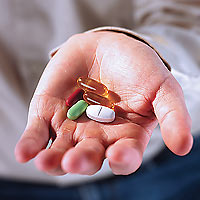
In addition to the Centers for Disease Control and Prevention (CDC)’s recommendations such as handwashing, physical distancing, and covering coughs and sneezes, implementing strategies to support your immune system may reduce your risk of contracting COVID-19 or the severity of infection. Though the scientific community’s understanding of COVID-19 is still developing, these strategies are supported by preclinical scientific evidence and what is currently known about the importance of inflammation to this disease’s virulence.
The Andrew Weil Center for Integrative Medicine has offered several of these strategies in their article “Integrative Considerations during the COVID-19 Pandemic” by Lise Alschuler, N.D. Moonflower Community Cooperative also asked local herbalist Emily Stock of Sundial Medicinals how she’s taking care of her immune system. Both sources cited the value of maintaining a healthy diet and lifestyle and using medicinal herbs and supplements.
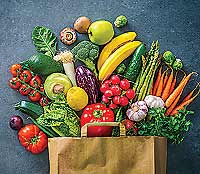 Diet: According to Emily, limiting sugar intake and increasing dietary protein helps the immune system perform optimally. Eating a variety of vegetables and fruits provides your body with a spectrum of vitamins and minerals necessary for essential functions, such as flavonoids. Many flavonoids have been found, in vitro, to specifically reduce signaling for the inflammatory response that causes COVID-19 symptoms. Aim for 5-7 servings of vegetables and 2-3 servings of fruits per day. Diet: According to Emily, limiting sugar intake and increasing dietary protein helps the immune system perform optimally. Eating a variety of vegetables and fruits provides your body with a spectrum of vitamins and minerals necessary for essential functions, such as flavonoids. Many flavonoids have been found, in vitro, to specifically reduce signaling for the inflammatory response that causes COVID-19 symptoms. Aim for 5-7 servings of vegetables and 2-3 servings of fruits per day.
Medicinal Herbs: Emily also uses medicinal herbs and mushrooms, especially astragalus and reishi. She says, “When taking longer term immune tonics such as these, a little bit every day is more effective than short term, larger doses. You can cook these herbs into your broths. Regular use of these herbs can lessen the severity of illness even if it is contracted.” However, if you do become sick, she noted to discontinue using them.
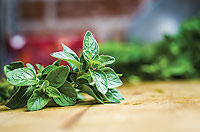 Emily also finds elderberry and echinacea helpful, as they are immune stimulants. Elderberry may be beneficial for prevention or early stages of coronavirus infection, so “they can be especially helpful in the short term if you feel you’ve been exposed, are vulnerable, or are living in proximity to someone who is sick,” Emily said. There is some scientific evidence that elderberry may inhibit replication and viral attachment of Human coronavirus NL63 (a different virus than COVID-19). Emily also finds elderberry and echinacea helpful, as they are immune stimulants. Elderberry may be beneficial for prevention or early stages of coronavirus infection, so “they can be especially helpful in the short term if you feel you’ve been exposed, are vulnerable, or are living in proximity to someone who is sick,” Emily said. There is some scientific evidence that elderberry may inhibit replication and viral attachment of Human coronavirus NL63 (a different virus than COVID-19).
Dietary Supplements: Emily takes vitamins C and D, zinc, and probiotics to support her immune system. Vitamins C and D (in certain clinical conditions) have been shown to have similar effects of flavonoids on inhibiting inflammation. Zinc has antiviral properties that can be helpful in preventing coronavirus entry into cells and reducing its virulence.
Adequate Sleep: Your body performs much of its internal maintenance while you sleep, and getting enough high quality sleep also ensures production of melatonin. Melatonin has been shown to reduce inflammatory cell recruitment during viral infections.
 Stress Management: Psychological stress takes a toll on the immune system and is associated with some cyotkines (proteins) that activate its inflammatory response. Practicing mindfulness or meditation and getting regular exercise may help reduce stress and regulate the nervous system. Stress Management: Psychological stress takes a toll on the immune system and is associated with some cyotkines (proteins) that activate its inflammatory response. Practicing mindfulness or meditation and getting regular exercise may help reduce stress and regulate the nervous system.
Exercise: Low-impact, low-intensity activities like yoga and soft martial arts can be particularly beneficial for the immune system (though any exercise is better than none). Muscles pump lymph fluid – a crucial component of the immune system – through the body, so the long, slow muscle contractions of these exercises are ideal for boosting the immune system.
Though much uncertainty remains about the future of the COVID-19 pandemic, taking action to maintain your body’s immune system may help to limit the spread of the disease. Few, if any of us will be unaffected by this virus. We owe it to ourselves and our community to maintain optimal health, so please consider augmenting social distancing and handwashing practices with some of these strategies.
|
How to Deal With COVID-19 Anxiety
by Doug McMurdo, reprinted with permission from The Times-Independent |
How does one deal with rising levels of anxiety in times like these?
It depends on what kind of anxiety one is experiencing.
“There’s no short answer to this question,” said Antje Rath, a clinical mental health counselor at Moab Regional Hospital. “Is it financial anxiety? Is it over loved ones getting sick? Is it about worrying your child won’t pass seventh grade?”
She said one of the smartest steps people can take is to have a routine. “You need some kind of structure for you and your kids.” Activities as simple as having breakfast at the same time every day, getting up and going to bed at the same time, and exercising.
She also said parents who suddenly find themselves home-schooling shouldn’t worry too much if they don’t feel up to the task. “People are going stir crazy at home. The people who are home-schooling right now: Don’t put so much pressure on yourselves. All the math and other work doesn’t have to be done right now. Focus on healthy activities, not just work.”
She also said there are a number of resources available for parents, such as tutors and other help. “Don’t hesitate to ask for help.”
Rath also said there are a number of resources available for those experiencing financial worries — which is almost everybody in the world these days — and she noted utility companies won’t turn off the lights or the gas. Food and clothing sources are available. She noted Realtor Dave Bierschied has collected a number of items.
In practice in Moab for the past 9 years, Rath said the conversations she’s having with clients range from concerns over elderly loved ones possibly getting sick, losing jobs, to their children’s interrupted education. She also said some of her clients have withdrawn, something that might not be healthy. She encourages people to “be creative” in how they continue to communicate with others.
She said it is critical to be honest with themselves and “figure out what you can control and what you can’t control.” You can control your own environment and you can do things to get involved. She cited the growing number of people who are sewing masks and gowns for Moab Regional Hospital.
“Practice gratitude. Life is difficult and scary right now, but there is lots to be grateful for,” she said. “Make yourself useful to others.” Rath also recommends practicing yoga and meditating — there are a number of guided meditations and yoga classes online — and she also suggests folks remember to be kind to others. “We’re all in this together.
Rath can be contacted by email at antjer@mrhmoab.org. She can also be reached by phone at 435-719-5500, option 2. Social worker Pam Marsing can be helpful to people in crisis and knows where resources can be found, said Rath. Marsing is reachable at 435-719-5531.
|
| Be Scared, or Be Prepared? |
Coronavirus. It’s the new reality. Americans can hardly think about anything else lately. It changes everything we do. It's even keeping mental health therapists working overtime dealing with the fallout. Anxiety is through the roof. Fortunately, taking action is empowering, and can reduce anxiety.
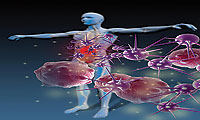
Most of us can probably do a much better job of washing our hands. Frequently. We touch contaminated surfaces like doorknobs and gasoline pumps and then touch our faces hundreds of times a day. We cough and sneeze into our hands instead of our arms or elbows. We can do better.
But what else can we do? Strengthen our immune systems. This is our best defense. Keep in mind that we are only routinely testing patients who have symptoms. Only 10% of those nationwide are coming back positive, meaning that the rest have other illnesses. And there are many more who are infected (like Senator Rand Paul) who would never know it unless they were tested. So chances are good that we will all be exposed to it, in spite of our best efforts, including quarantines.
How can you strengthen your armor to best protect yourself from becoming sick?
First, take a virtual chill pill. There is way too much panicking going on right now. The media is unhinged, whipping politicians and the public into a frenzy the likes of which we have never seen. Yes, the virus is something to be concerned about, and take appropriate action on. But you are far more likely to die of a heart attack or cancer than 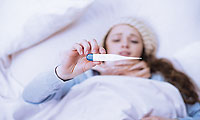 from COVID-19. And panic itself is very harmful to the immune system. Learn to manage your stress. We can help. from COVID-19. And panic itself is very harmful to the immune system. Learn to manage your stress. We can help.
Once you are calm and thinking rationally, use your free time in quarantine to reduce the toxins in your life. Toxins damage the body in many ways, including making it harder for you to fight infections. Don’t smoke, chew, inhale, drink, or expose your skin to other toxins. It’s like cutting off a soldier’s legs and then telling him to run. Ditto for sugar, which paralyzes white blood cells. Does it taste so good that you don’t mind increasing your risks of every infectious disease, cancer, heart disease, diabetes, Alzheimer’s, obesity, and so much more? When you are ready to “take out the garbage” you’ve been living with for so many years, we can walk you safely through the detox process.
Next, think about the quality of the food you eat. Where does it come from? What chemicals are in it? What chemicals were used to process it? What additives does it have? How many nutrients have been stripped from it? Is it really food, or just masquerading as food?
Keep in mind that the immune system isn’t magic. It needs resources. You probably give it more than enough calories. But all of that fuel is useless without the vitamins, minerals, and antioxidants that are necessary to convert it into energy and protect you from inflammation. Instead of guessing, we can actually test your micronutrients to make sure your immune system has everything it needs to protect you from all kinds of invaders, including viruses.
Optimize your vitamin D3. Don’t settle for average. This hormone is crucial to all immune functions in the body. After checking your level with a simple fasting blood test, take the prescribed amount to optimize it.
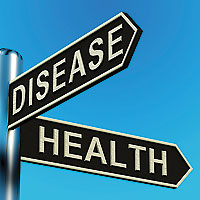
Take at least 1,000mg of high-grade vitamin C daily. Keep in mind that most over-the-counter vitamin C is of very poor quality, and your body knows the difference. A Maserati and a Volkswagen Beetle are both cars, but your experience in them is vastly different. We can help you find a high-quality vitamin C if you call the office.
There is no FDA-approved drug to prevent or cure Coronavirus. But if you implement these scientifically-proven strategies, your immune system will be in a much better position to ward off Coronavirus, flu, colds, and everything else. For more information, text “pwicv19” to 31996.
Most of all, stay calm. Panicking leads to foolish decisions and a weakened immune system. When you come into contact with Coronavirus—which is more likely than not—it's your immune system that is going to fail you, or save you. Do everything you can now to choose the latter. Better yet, rather than merely avoiding disease, focus on creating health. There's never been a better time than now, when your attention is focused more than ever on your health. Imagine coming out of this crisis healthier than you were before it started! Wouldn’t that be a nice unexpected blessing? We can show you how.
|
|
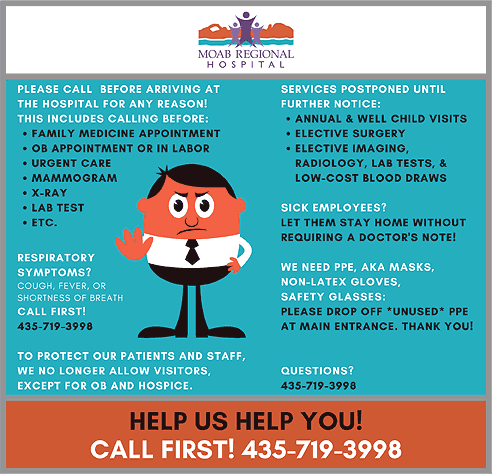 |
|
|
|
|
|
|
© 2002-2024 Moab Happenings. All rights
reserved.
Reproduction of information contained in this site is
expressly prohibited.
|
|